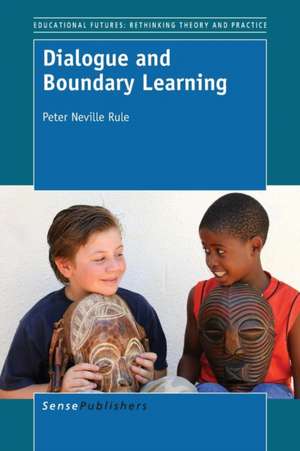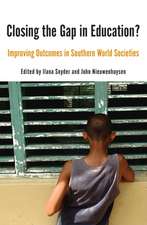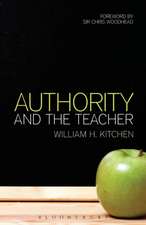Dialogue and Boundary Learning: Educational Futures, cartea 66
Autor Peter Ruleen Limba Engleză Paperback – 31 dec 2014
This book explores dialogue and learning in theory, practice and praxis across a spectrum of lifelong education contexts. It develops a philosophical basis by examining the lives, works and dialogic traditions of four key thinkers: Socrates, Martin Buber, Mikhail Bakhtin and Paulo Freire. It then examines dialogue and learning in contexts ranging from early childhood development to adult, community and higher education. In doing so, it develops and illustrates the innovative concepts of dialogic space, boundary learning and diacognition. It has a specific focus on learners and learning in contexts of oppression and marginality, and with a view to personal and social emancipation. It is located in an African context, specifically South Africa, although its resonance is both local and global.
The book marks an innovative contribution to our understanding of dialogue and learning, framed by the great dialogic traditions of the past, and is a dialogical provocation to the ongoing generation of praxis.
| Toate formatele și edițiile | Preț | Express |
|---|---|---|
| Paperback (1) | 398.12 lei 38-44 zile | |
| Brill – 31 dec 2014 | 398.12 lei 38-44 zile | |
| Hardback (1) | 572.59 lei 38-44 zile | |
| Brill – 31 dec 2014 | 572.59 lei 38-44 zile |
Din seria Educational Futures
-
 Preț: 411.87 lei
Preț: 411.87 lei -
 Preț: 383.59 lei
Preț: 383.59 lei -
 Preț: 398.22 lei
Preț: 398.22 lei -
 Preț: 332.44 lei
Preț: 332.44 lei -
 Preț: 417.15 lei
Preț: 417.15 lei -
 Preț: 402.76 lei
Preț: 402.76 lei -
 Preț: 410.06 lei
Preț: 410.06 lei -
 Preț: 402.55 lei
Preț: 402.55 lei -
 Preț: 394.12 lei
Preț: 394.12 lei -
 Preț: 424.34 lei
Preț: 424.34 lei -
 Preț: 396.75 lei
Preț: 396.75 lei -
 Preț: 412.41 lei
Preț: 412.41 lei -
 Preț: 392.15 lei
Preț: 392.15 lei -
 Preț: 404.55 lei
Preț: 404.55 lei -
 Preț: 381.00 lei
Preț: 381.00 lei -
 Preț: 401.80 lei
Preț: 401.80 lei -
 Preț: 397.53 lei
Preț: 397.53 lei -
 Preț: 389.75 lei
Preț: 389.75 lei -
 Preț: 384.73 lei
Preț: 384.73 lei -
 Preț: 395.91 lei
Preț: 395.91 lei -
 Preț: 419.31 lei
Preț: 419.31 lei -
 Preț: 388.53 lei
Preț: 388.53 lei -
 Preț: 394.46 lei
Preț: 394.46 lei -
 Preț: 384.94 lei
Preț: 384.94 lei -
 Preț: 478.71 lei
Preț: 478.71 lei -
 Preț: 412.69 lei
Preț: 412.69 lei -
 Preț: 432.39 lei
Preț: 432.39 lei -
 Preț: 394.12 lei
Preț: 394.12 lei -
 Preț: 402.73 lei
Preț: 402.73 lei -
 Preț: 397.48 lei
Preț: 397.48 lei -
 Preț: 385.17 lei
Preț: 385.17 lei - 19%
 Preț: 562.52 lei
Preț: 562.52 lei - 19%
 Preț: 598.69 lei
Preț: 598.69 lei -
 Preț: 406.94 lei
Preț: 406.94 lei - 19%
 Preț: 594.66 lei
Preț: 594.66 lei -
 Preț: 384.73 lei
Preț: 384.73 lei -
 Preț: 407.84 lei
Preț: 407.84 lei -
 Preț: 385.81 lei
Preț: 385.81 lei -
 Preț: 407.84 lei
Preț: 407.84 lei -
 Preț: 398.45 lei
Preț: 398.45 lei
Preț: 398.12 lei
Nou
Puncte Express: 597
Preț estimativ în valută:
76.19€ • 79.25$ • 62.90£
76.19€ • 79.25$ • 62.90£
Carte tipărită la comandă
Livrare economică 10-16 aprilie
Preluare comenzi: 021 569.72.76
Specificații
ISBN-13: 9789463001588
ISBN-10: 9463001581
Pagini: 202
Dimensiuni: 156 x 234 x 11 mm
Greutate: 0.28 kg
Editura: Brill
Colecția Brill
Seria Educational Futures
ISBN-10: 9463001581
Pagini: 202
Dimensiuni: 156 x 234 x 11 mm
Greutate: 0.28 kg
Editura: Brill
Colecția Brill
Seria Educational Futures
Recenzii
“This book is valuable for grounding lifelong learning experiences within an African context. It underlines the complexities involved in carrying out ‘authentic’ dialogue at different stages of education in Africa throughout the lifespan, exploring cases of border crossing and boundary maintenance.”—Peter Mayo, University of Malta and Series Editor of the International Issues in Adult Education Series












